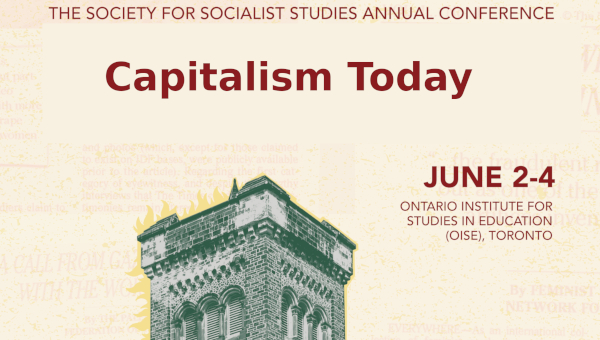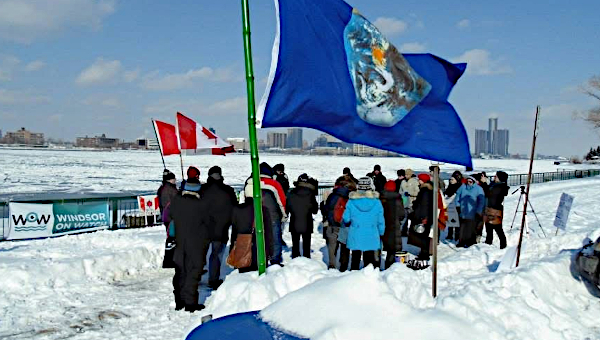Canada’s New Dissenting Academy
As the Canadian Federation for the Humanities and Social Sciences prepares for its annual Congress this May in Montreal, now is the time to create a new dissenting academy. A radical, anti-capitalist reorientation of academia – created for the explicit purpose of addressing urgent issues that stand before us – is necessary.
Theodore Roszak wrote in a collection of essays titled The Dissenting Academy (1967) that the university is rarely “anything better than the handmaiden of official society: the social club of ruling elites, the training school of whatever functionaries the status quo required.”
In the same collection of essays, Marshall Windmiller wrote a remarkable piece on political scientists in the U.S. and their direct involvement in the CIA and the war in Vietnam. Noam Chomsky’s infamous The Responsibility of Intellectuals closed the essay collection.
All authors agreed that the line between universities, the corporate world and government has blurred to irrelevancy. Social scientists were likewise active in planning some of the worst atrocities in recent history, and dissent within the academic community was shunned. The parallels with today are compelling.
Corporatization and the University
Concordia University will be hosting the 2010 Humanities and Social Science Congress this May, so parallels with the 1960s can be drawn with Concordia. However, most universities in Canada share similar characteristics, and this critique should be applied in equal measure to all post-secondary institutions.
Concordia President Judith Woodsworth recently returned from a mission to India with Quebec Premier Jean Charest and a number of business leaders. There can be no doubt that some of the 130 trade delegation members that joined the trade mission are part of Canada’s massive mining and finance sectors that trade on the Toronto Stock Exchange and are busy exploiting India’s natural resources while gross human rights violations take place. This is representative of the intertwining of universities and Canadian imperialism.

Woodsworth is a strong university president, and a breath of fresh air after the untimely and costly departure of the unpopular Claude Lajeunesse, but it is a shame that the president can praise India’s “flourishing economy, [and] rise of the middle class” without documenting the mass state violence and suppression of the rural poor taking place at this very moment in the name of “development.”
India’s “flourishing economy” also comes with a state military apparatus that is busy “burning villages, raping women, [and] burning food crops,” according to Arhundati Roy, whose recently-published Field Notes on Democracy is a must read.
Just this Tuesday, May 18, Canadian finance minister Jim Flaherty was in India stating that trade between the two countries has increased 70 per cent since 2007.
It is in this vein that all Canadian university trade missions to developing economies, such as China, should be regarded. It would not be at all surprising to see Canadian institutions go on a mission to Colombia once the Canadian free trade agreement is ratified this year in Ottawa!
Research interests also align very closely with prevailing government policy. The Canadian Department of Foreign Affairs and International Trade recently offered 10 fellowships of $5,000 each to graduate researchers who submit a paper on “Canada’s Role in the Circumpolar World.”
Research must focus on “the Arctic Council as a mechanism to advance Canada’s foreign policy objectives.” Just one month prior to this call for submissions, Prime Minister Stephen Harper was taking part in Operation Nanook, a military exercise demonstrating Canada’s “unyielding resolve” to protect the north from those nasty Norwegians. State leaders never stop for a moment to reflect on the madness of militarizing/colonizing the indigenous north precisely to exploit the very resources – namely fossil fuels – that helped cause the melting of these ice sheets in the first place.
Universities for the Status-Quo
University’s communications, journalism, business, engineering, geography and urban planning departments all sustain the status-quo with remarkable efficiency.
Students can take advanced courses in derivatives, a primary driver of the financial crisis, but the business school pats itself on the back for adding a course or two on business ethics or “sustainable development.” Lecture halls are named after banks, breweries and investors. Moreover, political science graduate programs across Canada are most often designed explicitly to train the new mandarins of Ottawa, with the largest growth in studies related to the security and international apparatuses of the state, rather than educating students as citizens for democracy and the building of social movements.
Yet there are urgent issues that require critical attention. The World Bank predicts an increase of 200,000 to 400,000 infant deaths as a result of the financial crisis, and bloody wars continue in Iraq, Afghanistan, Pakistan (thanks Obama) and Israel-Palestine, with women and children as the primary victims. Iran finds itself at a critical juncture. Global chronic malnutrition has reached historic levels, affecting one sixth of all humanity, according to a recent UN report.
The deteriorating environment is also a grave concern for the world’s leading scientists and humanity at large, and the global economy needs a radical rethink. There will be another financial crisis unless we make deep and fundamental changes to governance and finance. This must necessarily be a political and revolutionary project.
Yet intellectual responses to these crises have yet to coalesce around a broad national and international dissident movement, so the question begs itself: along what lines will this new dissenting academy be drawn? Geographer David Harvey offered a compelling framework during his 2010 World Social Forum speech, “Organizing for the Anti-Capitalist Transition.”
“The current knowledge structure,” Harvey said, “is clearly dysfunctional and equally clearly illegitimate. The only hope is that a new generation of perceptive students (in the broad sense of all those who seek to know the world) will clearly see it so and insist upon changing it.”
The time seems more than right to insist upon changing not only the illegitimate structure of our education system but also the illegitimate cultural, economic and governmental structures that perpetuate this perilous trajectory.
Seeds of Dissent
There are seeds of dissent at Concordia as at other university campuses, but not nearly enough for a sustained movement. This winter’s well attended Study in Action Conference should serve as a springboard for a broader dissident movement, and there are clear signs of organizing within the Association pour une Solidarité Syndical Étudiante and Free Education Montreal.
A Concordia graduate union meeting last week drew over 130 students, and there is clearly a swelling of dissent within the academy following notice of tuition hikes, 30 per cent pay cuts to teaching assistants and a condensing of payment schemes that will adversely affect low income students.
Fortunately, hundreds of Concordia students have developed a highly-functional network of dissent. But like at other campuses, Canada’s student movement needs some unifying purpose, a galvanizing point, increased organizational coherence, and connection to the wider struggles against the deepening of neoliberalism from the financial crisis.
At Concordia, to use as an illustrative example of what could be paralleled at other campuses, the Quebec Public Interest Research Group at Concordia (QPIRG Concordia), the Red School, the Community University Research Exchange (CURE), Free Education Montreal – are all key student organizations that are slowly coming together.
That said, the main representative organizations of students – the Concordia Student Union and the Arts and Science Federation of Association and most student organizations – have been painfully silent on the upcoming tuition hikes.
In Quebec, a movement toward a student strike should also be on the table, and this can only be achieved by deepening the organizational linkages of student activists and connecting to wider political struggles.
An anti-capitalist student movement must also necessarily be international in scope. Canadian internationalists must develop strong links not only between provinces but between states and continents. Campus occupations in Puerto Rico and California must receive direct material and social support from a Canada-wide student movement.
More broadly, teach-ins like the “Anti-capitalist Teach-in Against the G8/G20” being held in Montreal must become regular affairs. New educational systems must flourish, along with educational cooperatives and a well organized communications strategy to facilitate this process. Student-run organizations must come together to form a unified movement with pan-Canadian and international links. This is merely a sketch of what must emerge in the face of local and global injustice and the evident way that the financial crisis is now playing out in public sector austerity and further attacks on public institutions. As the Congress of academic associations meets this month, such discussions must be put on the agenda of faculty as much as students. As Canadian programs spending promises to reach lows not seen since World War II, these anti-capitalist and indeed revolutionary ideas do have a window of opportunity to take material form. •





